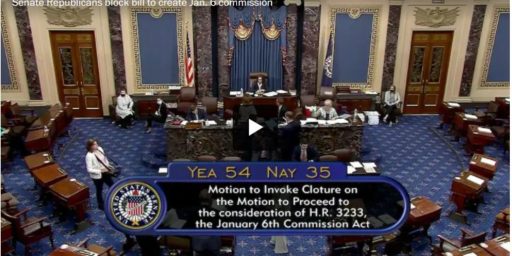WEIRD NEWS
I stumbled across this one looking for caption contest photos:

(AP Photo/University of North Carolina at Wilmington, Dr. Steven Miller)
Yahoo! News – Top Stories Photos – AP
“A report by the Pew Oceans Commission called for a new federal agency to manage America’s oceans. “
Now, how exactly is a US agency going to manage the oceans? First of all, while I’m as nationalistic as the next guy, I don’t think the US actually owns any oceans, although we do claim territorial rights to 12 miles off our coasts. Secondarily, how on earth would an agency go about managing the oceans, anyway? They’re rather, well, large.
The Pew Oceans Commission, of which I had never previously heard but of which I am rather amused to learn that Leon Paneta is the chairman, has some info on their website, including the complete report. I don’t have time or inclination to read all 144 pages but the Executive Summary provides some insights. While speaking in platitudes about large goals that most would agree on, the commission calls for sweeping legislation that would seem to virtually eliminate state control over commerce, compartmentalize problems, and cost untold sums of money. I’d be interested in feedback on this from people who study this issue; I just stumbled upon this by accident.





Great picture, and even better point about “America’s Oceans”.
We’re currently fighting a war we neither sought nor started. As a result, people who want the United States to lose – in other words, everyone except poor people who don’t hate Jews – frequently and loudly don sackcloth and ashes (or peasant shirts and fashionable sandals) and call us “imperialists.”
Leaving aside the obvious ignorance of history or political philosophy this implies, can you imagine what would happen if the Bush administration, or any past or future administration, actually staked a claim to the world’s oceans? The response from one Boston reporter was bad enough after we asserted a decades-old option under the Law of the Sea.
Who is going to pay for this oceans management? Which agency does this fall under, Interior? Maybe there should be a new Department of the Exterior.
Years ago I took a class on the Law of the Sea. It was enough to keep me out of law school for good (but grad school in the humanities–a damn sight worse!). I have also co-taught a class in ecological history where we spent considerable time covering the disappearance of fish stocks and the concept of the world’s seas as commons. This makes me marginally qualified, I suppose, to comment on the matter at hand.
First, a historical perspective: things REALLY are dire. This recent report estimates that 10% of fish stocks are all that remain worldwide after centuries of overfishing. That’s a guess but a fair one. When Europeans first arrived off the coast of New England and Newfoundland the cod were so huge and plentiful they could just spear them from the boat. Smoked cod was the first bumper crop of the new world, and it took hundreds of years to both deplete stocks and fundamentally alter the ecosystem so the fish shrank in size several times over.
The operative concept here is the “fisherman’s dilemma”: that’s the notion that any fish I might leave behind (whether by accident or design) will most likely be caught by a competitor coming right behind me. Where then is my incentive for leaving that fish? Even if I know that it’s too small to be worth much, or that I’m destroying the species’ capacity to reproduce, my bottom line is that the fish is dead one way or another. Might as well be in my pile as the next guy’s.
I know libertarians and anti-govt types are disinclined to see benefit in calls like Mr. Panetta’s for swift govt action and NEW bureaucracies. But its hard to see the flaw in his reasoning. Right now we have a hodgepodge of state and national regulations on everything from size of catch to length of season to policy toward fish farming. The fisherman’s dilemma is operative here as well: what my state’s fishermen don’t catch will go to a neighboring state or one of those huge (often illegal) foreign trawlers. Regulations are often lightly enforced. Where’s my incentive to “do the right thing” by the fish? Only when I KNOW that someone has a plan, that rules will be enforced, and that at some point in the future stocks will rebound–only then will I cooperate. Well, you may still need to buy me off bigtime, but frankly there are so few fisherman left in this country, this wouldn’t be so bad either. We did it back in the 70s, but then some knucklehead politicians cooked up a scheme to buy them all big new boats in the 80s. Let’s not do THAT again.
And just to give a little global perspective, as bad as we Americans have done in protecting our oceans, once again we see that everyone else has been oh so much worse. In much of Asia they have utterly laid waste to their most productive coastal waters by dynamiting and dumping arsenic in them (hey, it’s much easier to collect the floating fish on the water than by using nets or hooks!) To the best of my knowledge we have not encouraged any of this, but we’ll probably get blamed for this stuff too.
So, let’s not hear disparaging comments about Leon and the folks at Pew. There may still be time to fix the damage, at least here in N. America. I for one would like to see us try.
Kelli,
You didn’t answer the question: How can a US govt. agency manage oceans over which the US has no legal control?
Or is Paneta perhaps saying that the UN is superfluous, international treaties are useless and only the USA has the power to do anything?
Well, I suppose the Government that creates an agency to administer space (NASA) could create an agency to manage oceans no problem 😉
Now back to the deep questions.
After checking out the Pew site to follow up on that widely MIS/MALquoted report about how folks around the world feel about us, MB wandered further around the premises. PEE-YEW about says it all; a gathering of pretentious prats! Full of themselves, with titles, fancy boards, and THEY KNOW WHAT’S BEST FOR YOU!
Just ask any effing academic and they will tell you they are sooooo effing smart that they can manage everything. Problem is they can’t even s*** right. Most academics are a bunch of effing clowns that if they lived 1,000 years ago would die of starvation, and that actually would be a good thing.
A couple of years ago, I worked with a gentleman putting together a fishing tracking system for Mississippi. It was intended to spread to Louisiana and Alabama. He told me then that the several States were afraid that the federal government was going to step in and clear up the aquaculture “mess” we’re in.
Now, I don’t know how bad it really is. Some fishermen here say there’s no problem, it’s all about the money and the control. Others say — like the aforementioned gentleman — that it’s really bad. Everyone, however, agreed on one thing.
A one-size fits all program, run by the EPA, would be a disaster. I’ll have to check and see what he thinks about all of this.
Oh, and to answer two questions from the comments above:
What agency? My understanding was that it would fall under the Environmental Protection Agency. Go on when you stop shaking.
How can they regulate something beyond the limits of their control? Well, they don’t regulate the oceans, they monitor, police, and attempt to control the actions of their citizens (and anybody else who’ll hold still) out there on the briny blue. How many fish did you catch? Fill out this form, as required by law. Oh, you caught too many! Your license is revoked, and we’re fining you. Go straight to jail. What’s that? You think you can lie on our forms? Well, that’s illegal too. And we have inspectors, and all that that implies.
Have a nice day. We’re from the government, and we’re here to help.
Ciao.
This may be pointless, given the level of hostility on display here to the very idea that government intervention is sometimes the only viable solution to a nasty problem. I mean, I presume we’re all agreed that there should be ONE national military, not a random assortment of private and state paramilitary forces who don’t train alike, have incompatible weapons, different uniforms–kinda like the Union Army in the early years of the Civil War. Why do you think it took so damn long to fight that one?
Back to the point (oh yeah, there was one). I would argue that the EPA, the Interior Department, and other federal agencies authorized to safeguard our natural resources have actually done a pretty good job these past few decades. They foster basic research and prevent the most egregiously harmful activities (anyone here want to go back to the days when dioxin could be buried in your neighbor’s back yard? I didn’t think so). Are they perfect agencies? No, but they’re far from useless.
So what would a federal agency with the mandate of protecting our coastal waterways do? Look, I don’t know all the details here, but neither do any of you. I presume they would carry out and publish basic scientific research into the health of the environment and fish stocks (anyone have problems with that?), publish said findings, and try to enact legislation (with the oversight of Congress, the courts, etc.) designed to keep everything from going to hell. What exactly is your problem with that?
As for KCat’s question regarding jurisdiction, I presume Panetta and co. are talking here about the 200 miles offshore we claim rights over. Sure, the Law of the Sea says 12, but the other 188 are to all intents and purposes ours too. We cannot do much about any other country’s activities in their own waters, that’s true. It’s not even clear, under WTO, whether we can refuse to buy from countries with atrocious fisheries policies. What we need to do, first, is get our own act together and negotiate solid agreements with our neighbors. Then, at the very least, we could collectively stop foreign trawlers from wreaking havoc in our waters, which will become even more common after they’ve destroyed their own.
Finally, Daniel Morris, if you’re still out there: what do you propose we do? I see a lot of grousing, but no ideas.
Not to be a jerk but…
(ever notice that line always preceeds someone being a jerk?)
You say: “First, a historical perspective: things REALLY are dire. This recent report estimates that 10% of fish stocks are all that remain worldwide after centuries of overfishing.”
That 10% number has been around for almost 30 years. In fact, recently there was a “report” (I love reports) that said that 90% of the worlds fish stocks have been caught in the last 30 years. That would mean in about 24 months we run out of fish.
But last year Louisiana and many other states had record fish catches. How can it be?
People (Ted Danson I think) stood up on the first “Earth Day” stage and said that if we did not fix the “ocean problem” the whole world would run out of food and we die in 4 years.
That was 25+ years ago and we are all still here.
It is obvious to everyone that there ain’t as many fish in the sea as there once was. But overstating the issue to make drama only serves to make people like me write you off as a loon.
Paul
And arguing that the Federal Goverment can somehow “fix this” is so laughable I won’t even bother touch that one. If you belief that one, perhaps you should ask for the Tooth Fairy to help out too.
You say, “I don’t know all the details here, . . . but I presume they [meaning some Federal agency; I posited the EPA] would . . . keep everything from going to hell.” Well, I don’t know all of the details, either, but you dismissed the ones I shared because you perceived a “level of hostility . . . to the very idea that government intervention is sometimes the only viable solution to a nasty problem.”
Well, I’m not hostile to “government intervention” but I think that it’s premature to hand it to the Federal level before the States have even had a chance to look at it. The jury is still out on how “nasty” the problem is. You may disagree. Grown-ups often do.
However, I think your fondness for the aforementioned “intervention” is more significant than any real or perceived hostility. Why are you so anxious to make it a Federal case?
For what I’ve done, I — me, myself — worked on a project to implement fishing monitoring for the purpose of determining whether or not there was a problem, and if there was, to try and measure its dimensions. Follow-on work — upon which I have not been free to contribute, due to a host of issues — would have probably included the spread to joint, regional monitoring by the several Gulf Coast States. The sponsor was a government department of the State of Mississippi. I worked for a man who had the government contract.
Reviewing my notes, the other potential users would’ve been Louisiana and Florida. Alabama was, “doing their own thing, and might participate in the future.” This was in late 1999 and early 2000; I don’t know what’s happened since then.
The only grousing I recall involved the long hours and the miserly pay scale. Beyond that, there’s no need to become exercised. I didn’t leave, I was just getting on with my life, making some phone calls, and hoping to take in a movie.
Furthermore, the people involved in the implementation of the system had pretty much universally come to the conclusion that a national system, implemented and run by the EPA, would not have been to anyone’s long-term benefit except the EPA’s.
This was the opinion of biologists, aquaculture specialists, politicians, fisherman, distributors, canners, packers, the people who made boats for commercial fishermen, the people who made fishing gear, and the other members of the team I was on.
Tellingly, it was not the opinion of a disproportionately vocal group of environmental activists. The fact that the existence, let alone the extent, of any problems were unmeasured did not make any difference to their urgent demand for immediate action. One finally told me, after about an hour of discussion on the scientific merits, “Look, Dan. They’re raping the Oceans for a few dollars. I don’t care how bad it is. I won’t let it get any worse.”
The pronouncement was greeted with applause, and followed by abuse. Are you sure you want to make this a discussion about hostility?
As for what I think we should do, it involves first the observation of the specific, local conditions; the formulation of ideas about those; the precise, accurate, repeatable testing of individual ideas in an open, peer reviewed manner; and — finally — the careful, public, and measured implementation of those solutions which best deal with the situation appropriately, considering all factors by the people most likely to be affected. Those factors must include human jobs and livelihoods, economic constraints, and feasibility as well as the short- and long-term viability of the marine resources. Maybe you’ve heard of something like that?
Finally, one of the case studies used at that time was the success of private owners in protecting African Elephants from ivory poachers. It seems the government had done a very poor job. People like you and me were given rights to harvest ivory post mortum. They had the responsibility to protect the animals and their own self-interests, and it reportedly went swimmingly.
So why are you so certain that we need the EPA or something like it?
—